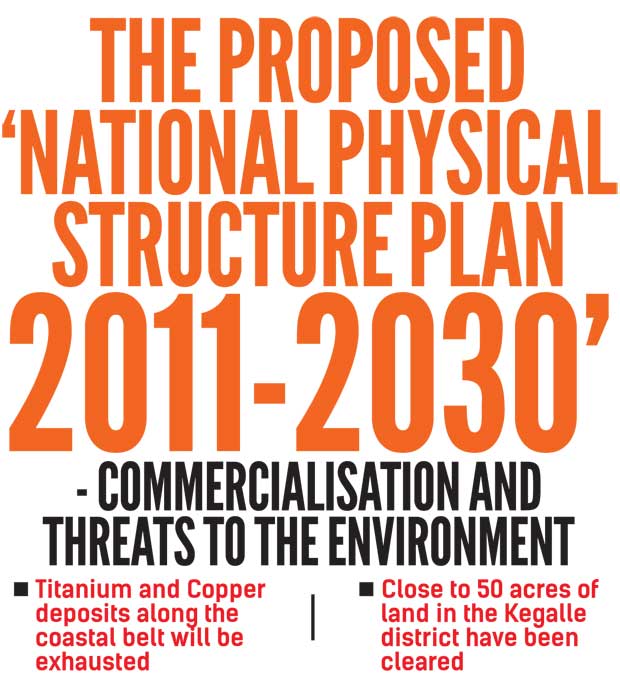Reply To:
Name - Reply Comment
Last Updated : 2024-04-20 00:00:00

 the environment in Sri Lanka. Sadly today, many rainforests and other natural resources are in the process of being exhausted as a result of this commercialisation. At a recently held press conference, the Centre for Environmental Studies (CENS) shed light on the proposed ‘National Physical Structure Plan’ (NPSP), its objectives and the adverse impacts on the environment.
the environment in Sri Lanka. Sadly today, many rainforests and other natural resources are in the process of being exhausted as a result of this commercialisation. At a recently held press conference, the Centre for Environmental Studies (CENS) shed light on the proposed ‘National Physical Structure Plan’ (NPSP), its objectives and the adverse impacts on the environment. 
 Ravindra Kariyawasam
Ravindra KariyawasamSpeaking at the press conference, environmentalist and National coordinator of CENS, Ravindra Kariyawasam said the government was trying to implement this plan without giving any insight to the public. “This plan was begun during the former regime and its main aim is to transform Sri Lanka into a knowledge, aviation, production and energy-based hub in South East Asia by 2030. In order to achieve this far-fetched goal, several international bodies such as the World Bank, Asian Development Bank and the International Monetary Fund have made requests to the present government as well. According to the National Physical Structure Plan, the government has planned to construct six mega-cities for example, one city connecting Gampaha and Kalutara, another in Galle, Hambantota, Batticaloa, another connecting Trincomalee, Anuradhapura and Polonnaruwa and the Jaffna city itself. There is an upcoming network of highways spanning from the South Coast to the North and the East and the entire country. But this will not end here. This network of highways will eventually reach India across Adam’s Bridge and would eventually be one phase of the South Asian network of highways. This network is constructed by utilizing the resources that are freely available in our land today.”
Speaking further, Ravindra said the main source of income for this NPSP was the tourism industry. “Therefore, many areas have been identified as eco-tourism zones. With this identification process, many hotels too will be established in these areas. In addition to that, elements such as Titanium and Copper which are found in abundance along the coastal belt will also be exhausted as a result of these projects. In terms of agriculture it is quite evident that Sri Lanka has been sold into the hands of various multi-national companies. One American company has acquired acres and acres of land for cultivation purposes.
As of now, close to 50 acres of land in the Kegalle district have been cleared and several lands in Kalutara and Mathugama have been acquired to plant palm trees. There is an ongoing project to seek permission from farmers to manage water for irrigation purposes. In other words, the government is seeking permission from farmers to sell the reservoirs and the wells. On the other hand, mini-hydro power plants are mushrooming across the country and many of these plants produce non-renewable energy.”
“Quite a number of forests will be destroyed due to this project. This would affect natural habitats and pose a threat to local flora and fauna. At this rate, by 2030, only around 10% of local rainforests will be left. The question here is whether this 10% would be able to provide water to the entire land. Moreover, this clearing of forests would impose a threat to local flora and fauna and eventually lead to their extinction,” said Ravindra. In his concluding remarks, Ravindra said that before these projects commenced, there should have been an Environmental Impact Assessment (EIA), but this was done in quite an ad hoc way. “The people involved would blindly produce a report and then move on to the extent of cross-questioning us to see if everything was in place. A proper EIA would weigh the pros and cons of conducting the project but the EIAs which were produced are useless documents. During the previous years, there were many protests staged against the Darbur Company which was set up in Kotadeniyawa to produce an Indian fruit drink. Recently we saw how the Coca Cola Company carried out discussions with the government to establish their production plant in Sri Lanka and export to India. The previously mentioned highway network is also in aid of this transaction because Coca Cola bottles cannot be transported by air. Therefore, once the highways are built connecting India, this transaction will be made easier.”
 Fr. Ashok Stephen
Fr. Ashok StephenIn his comments, Fr. Ashok Stephen representing The Centre for Society and Religion (CSR) said that it was important that all human beings should come forward to protect the environment during the development process. “Humans are the guardians of nature but today we see that these guardians are politicians. Hence, we can see the results today. The development and conservation of nature should go hand-in-hand. But development should happen in such a way so that natural resources are not exhausted. These resources should be preserved for future generations. Quite a number of projects take place without the proper assessment of their impact on nature and this I believe is quite a serious matter. Irrespective of the regime, there is a greater impact on the environment due to these ongoing projects and those involved are geared to carry them out illegally. Therefore, it’s high time that we spread the message around and open the eyes of the public to save our country from facing any other man-made disaster in future.”

Add comment
Comments will be edited (grammar, spelling and slang) and authorized at the discretion of Daily Mirror online. The website also has the right not to publish selected comments.
Reply To:
Name - Reply Comment
On March 26, a couple arriving from Thailand was arrested with 88 live animal
According to villagers from Naula-Moragolla out of 105 families 80 can afford
Is the situation in Sri Lanka so grim that locals harbour hope that they coul
A recent post on social media revealed that three purple-faced langurs near t